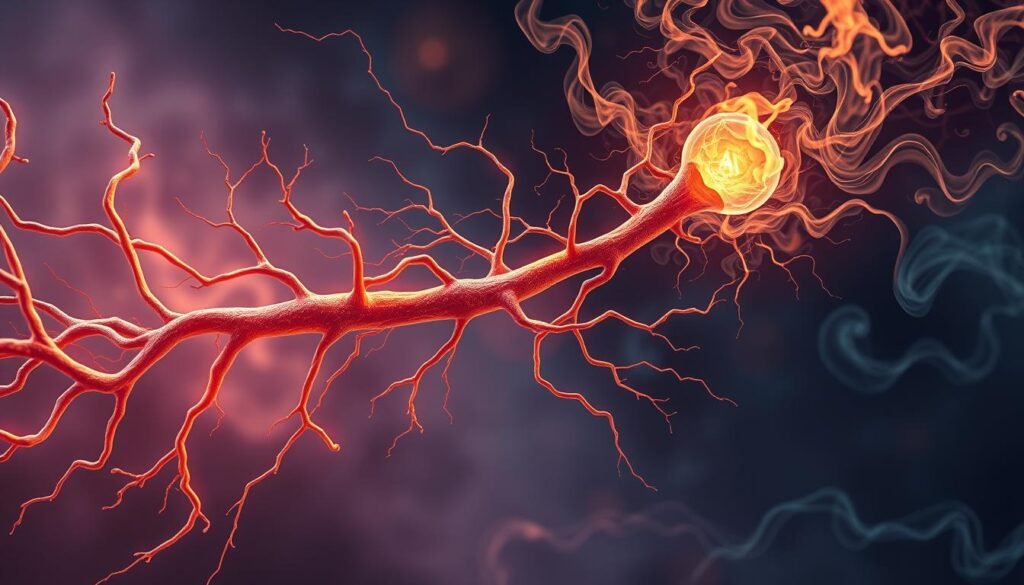Did you know the vagus nerve can help prevent stress-related issues like PTSD and anxiety? This nerve plays a big role in our calm system. It makes anti-anxiety remedies work better, offering natural relief. Learning how it works with anxiety lets us find many ways to feel better.
Techniques like deep breathing, being mindful, and laughing can boost this nerve activity. This improves how we handle stress. By understanding these connections, we can find calm and peace more easily.
Key Takeaways
- The vagus nerve is key to controlling anxiety and stress.
- Stimulating this nerve can help avoid issues like PTSD and depression.
- Practices like bee humming breathing turn on the vagus nerve.
- Laughing is a fun way to activate the vagus nerve and relax.
- Exercising improves how well the vagus nerve works, helping with anxiety.
- Cold showers can make heart rate more varied, which is good for the vagus nerve.
Understanding the Vagus Nerve
The vagus nerve is often called the “wandering nerve.” It is crucial for many body functions. It stretches around 40 to 50 cm, making it the longest cranial nerve we have. This important nerve links the brain to vital organs. It connects to the heart, lungs, and digestive system. These connections make it key to our autonomic nervous system. This system manages actions we don’t think about. Like breathing, controlling our heart rate, and digestion.
This nerve has 12 pairs of ganglia, filled with around 10,000 neurons each. It greatly affects our emotional and physical well-being. Activating the vagus nerve helps us stay balanced and calms us down after stress. Stress can increase neurotransmitters, leading to anxiety. People with chronic anxiety might have lower activity in this nerve. This can impact how blood flows to the brain and trigger physical symptoms. For example, panic attacks can shoot up adrenaline, causing a faster heart rate and lots of sweating.
Keeping your vagus nerve healthy helps manage stress. Doing things like eating right helps your digestive system because of the nerve’s location. Getting enough sleep, enjoying sunlight, and exercising boost serotonin. This hormone fights stress. Making these positive changes in your life can make you feel better. They support the autonomic nervous system’s tasks.
| Function of the Vagus Nerve | Impact |
|---|---|
| Regulates heart rate | Helps maintain stable cardiovascular health |
| Controls digestive processes | Facilitates easier digestion and nutrient absorption |
| Contributes to emotional regulation | Supports mental well-being and stability |
| Promotes relaxation | Assists in recovering from stress responses |
What is Vagus Nerve Anxiety?
Vagus nerve anxiety happens when our body’s anxiety levels go up because of the sympathetic nervous system getting activated. This often happens when we feel threatened, starting the fight or flight response. People with vagus nerve anxiety stay very alert, leading to chronic stress.
The vagus nerve helps control our mood, heart rate, and how we digest food as part of the body’s stress response. If someone has a low vagal tone, it’s harder for them to calm down from being alarmed. This can cause mood swings, anxiety, and other health issues. It’s important to know how vagus nerve anxiety and stress response are connected to manage them well.
There are many ways to help the vagus nerve fight anxiety. Deep breathing, being mindful, and certain therapies can make the vagal tone better. With these methods, people can feel less anxious and deal with stress better.
| Vagal Tone | Effects on Body | Implications for Mental Health |
|---|---|---|
| High Vagal Tone | Lower resting heart rate, reduced blood pressure, enhanced digestion | Improved stress resilience and lower anxiety levels |
| Low Vagal Tone | Heightened stress reactivity, gastrointestinal issues | Increased risk of anxiety and depression |
The Role of the Parasympathetic Nervous System
The parasympathetic nervous system is key to relaxing the body. It works against the fight-or-flight response caused by the sympathetic nervous system. It helps bring on calm, reducing stress and anxiety and making us feel relaxed.
This system plays a big part in how our body works. It controls heart rate, helps with digestion, and affects breathing. The vagus nerve connects to many organs, highlighting the importance of good vagal tone for our health.
Doing things like meditation and yoga can improve vagal tone. This makes us better at dealing with stress. Studies suggest vagus nerve stimulation might help with severe depression and PTSD.

Taking 5–10 minutes a day for light exercise or mindfulness can boost this system. These activities help our heart rate return to normal. This is vital for overall health.
In short, the parasympathetic nervous system aids in relaxation and health, thanks to the vagus nerve. Simple calming activities can greatly enhance our well-being.
Why Vagus Nerve Stimulation is Important
Vagus nerve stimulation is key for our mental and physical health. It helps us balance how we respond to stress, which is great for managing anxiety. Many people find their mood improves and their anxiety drops when they use methods to stimulate the vagus nerve.
Studies show it can make your heart rate more variable, which is a sign of good health and emotional balance. For about one-third of people with epilepsy, standard medicines don’t stop their seizures. Vagus nerve stimulation can reduce seizures for them, offering new hope. It’s been FDA approved for this and also for treating depression in adults who haven’t found help in other treatments.
It does more than help with anxiety. It could make you do better in school and boost your brainpower. For people treated over time, it especially helps with various health issues. Those with autism spectrum disorder find it useful when usual therapies don’t work well. It offers an added option to improve their treatment results.

It’s a big deal for those dealing with mental health issues or recovering from a stroke or chronic inflammation. The FDA has also approved its use in stroke rehab, showing its wide-ranging benefits for health. Research into using it for Alzheimer’s disease and rheumatoid arthritis is promising. It shows how vagus nerve stimulation could play a big part in better health and anxiety management in the future.
| Condition | Vagus Nerve Stimulation Impact | FDA Approval Status |
|---|---|---|
| Epilepsy | Can reduce seizures; up to 50% fewer | Approved |
| Treatment-resistant depression | Offers hope for improvement | Approved |
| Stroke recovery | Enhances rehabilitation efforts | Approved |
| Chronic conditions (e.g., rheumatoid arthritis, Alzheimer’s) | Under study for potential benefits | Research ongoing |
How Chronic Stress Affects the Vagus Nerve
Chronic stress is a big problem for the vagus nerve, which matters a lot for mental health. It triggers the fight-or-flight response, leading to many negative effects. If our bodies stay in this alert mode, the health of the vagus nerve suffers.
This ongoing stress hurts how well the vagus nerve works. Too much stress hormone, like cortisol, can make us feel more anxious or depressed. It can also cause physical issues like ongoing pain and swelling. Studies show that stress can really harm the health of the vagus nerve.
It’s key to handle stress right to keep the vagus nerve working well. Doing things like working out, meditating, and taking deep breaths helps. These actions can make the vagus nerve stronger and improve how we feel overall.
Learning how chronic stress and the vagus nerve are linked shows why we must care for our mental health actively. Handling stress supports the vagus nerve and fights mental health problems.

| Impact of Chronic Stress on Vagus Nerve | Consequences |
|---|---|
| Activation of fight-or-flight response | Depletion of vagal tone |
| Increased cortisol levels | Heightened anxiety and depression |
| Chronic tension | Physical ailments (pain and inflammation) |
| Impaired recovery from stressors | Long-term mental health issues |
Natural Methods for Vagus Nerve Stimulation
Exploring natural methods for stimulating the vagus nerve boosts well-being. Deep breathing, mindfulness, and regular exercise are key. They activate the vagus nerve, bring relaxation, and help manage anxiety.
Deep Breathing Exercises
Slow, deep breathing is a powerful way to stimulate the vagus nerve. It triggers relaxation, cutting down stress and anxiety. This practice fits easily into daily life, asking for just a few minutes to focus on breath.
Mindfulness Techniques
Using mindfulness techniques like meditation improves vagal tone. These methods reduce the stress in our minds, keeping us present and aware. The benefits for the vagus nerve and our mental health are huge.
Benefits of Exercise
Regular exercise boosts vagal tone and mood. It increases blood flow and releases endorphins, which help with stress. Jogging, swimming, or cycling are great for stimulating the vagus nerve and improving well-being.
To better understand anxiety management, it’s essential to know the signs of moderate anxiety. Recognizing them is the first step towards getting the right help and enhancing mental health.
| Method | Description | Benefits |
|---|---|---|
| Deep Breathing Exercises | Diaphragmatic breathing to promote relaxation. | Reduces stress and lowers anxiety levels. |
| Mindfulness Techniques | Meditation and awareness practices. | Enhances emotional regulation and clarity. |
| Exercise | Endurance and interval workouts. | Improves mood and vagal tone while reducing anxiety. |
Connection Between Heart Rate Variability and Vagus Nerve Anxiety
Heart rate variability (HRV) is a key sign of how well our body handles stress. A higher HRV means a healthier vagus nerve. It shows our body can adapt to changes and stress well. People with good vagal tone can deal with stress better, feeling less anxious.
Those with low HRV might feel more stress and anxiety. This is because their bodies react more to stress.
Anxiety management greatly benefits from a healthy HRV level. Studies find that people with anxiety disorders often have lower HRV. A review of many studies confirmed that anxiety disorders can lead to decreased HRV.
Using heart rate variability biofeedback can help reduce anxiety’s negative effects. It works by improving how the nervous system responds to stress. With tools like the Lief Smart Patch, people can practice HRV biofeedback easily. This helps manage anxiety better by regulating the body’s stress response.
Knowing how HRV and the vagus nerve are connected helps us find new ways to improve mental health. Boosting HRV can make us feel more relaxed and bounce back quicker from stress. It’s a powerful method for enhancing our well-being.
Laugh Your Way to Calm
Laughter is more than just reacting to something funny. It’s a key to relaxing by stimulating the vagus nerve. When we laugh, our belly muscles work and our breathing improves. This helps calm us down by lowering stress hormones and boosting mood. By laughing from comedy, fun activities, or chatting, we can better handle anxiety.
Studies show that laughter enhances heart health and helps us manage emotions and connect with others. When we’re stressed, a good laugh can lift our spirits instantly. It triggers the body’s way of relaxing. Sharing a laugh over videos, trying laughter yoga, or joking around can make a big difference.
To improve our overall health, laughing is a great tool. It not only brings joy but also supports mental and physical health by making the vagus nerve stronger and lowering blood pressure. Laughter fits well with other healthy activities like deep breathing and peaceful walks. Together, they help us achieve well-being.